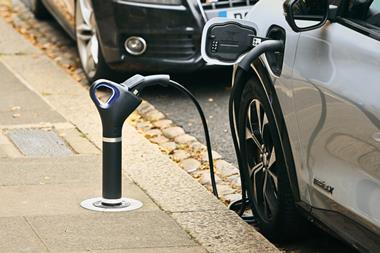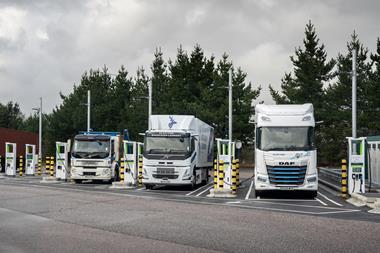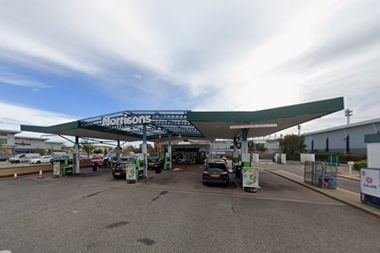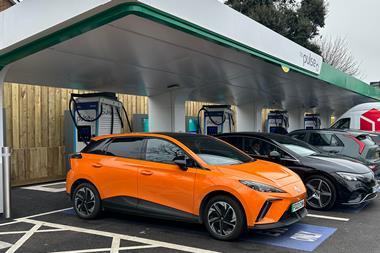
This past year has been another eventful one for the forecourt sector. Against a backdrop of rising costs, increased crime and more EV vehicles on the roads, retailers have had to work harder than ever to remain relevant

Fuel prices – under the spotlight more than ever before
If any fuel retailer didn’t know what the letters CMA stood for at the beginning of 2023, they soon found out. That’s because the fuel retailing industry was definitely under the Competition and Markets Authority’s gaze during the year.
It all started in 2022, with a review into whether the cut in fuel duty, announced in March of that year, had been passed on to consumers. This review led to a full-blown Road Fuel Market Study, by the CMA and allowing it to use compulsory information-gathering powers to probe the entire market.
Fast forward to May 2023, and the CMA reported that it was unhappy with the level of engagement from supermarkets in its Road Fuel Market Study and so would be conducting formal interviews with the supermarkets’ senior management.
The CMA was not happy with what it found and said the supermarkets had failed to compete effectively on prices. It then called for the introduction of a new fuel finder scheme with ‘open data’ requirements from fuel retailers. The government quickly agreed to the scheme.
Top 50 Indies, Ascona, MFG, Rontec and SGN were all participants in the voluntary temporary fuel price scheme, agreeing to upload their prices daily to the register. Asda became the first supermarket to publish its prices.
In September, the fuel pricing monitor PetrolPrices incorporated data from the voluntary price sharing scheme. This means PetrolPrices now has over 3,800 petrol stations providing daily price information for unleaded, diesel, super unleaded and premium diesel.
However, even this transparent pricing was not good enough for the likes of the RAC, whose fuel spokesman Simon Williams said it would have little effect on prices: “We don’t believe displaying them on websites will suddenly make retailers start charging fairer prices.”
The RAC continued to criticise the fuel sector for its pricing, saying retailers were ‘ripping off’ the public. The PRA did a good job in countering this message, saying that independents continue to price competitively in a dynamic market.
In its first monitoring report on road fuel, the CMA criticised retailers for their fuel margins but the PRA countered by saying that fuel retailers had no choice but to maintain margins because of massive increases in their operating costs.

Crime – a worrying increase in incidents across the board
The biggest story crime-wise for forecourts in 2023 came in October when BOSS, the British Oil Security Syndicate, reported that incidents of unpaid fuel had reached their highest level since the Forecourt Crime Index was introduced in 2015.
The BOSS figures found that while the number of drive-offs had increased, incidents of no means of payment (NMoP) had actually fallen.
However, fuel theft was not the only problem forecourt operators had to deal with as the cost-of-living crisis meant shoplifting was more prevalent than ever during 2023.
The ACS released figures from a survey of 1,200 independent retailers which revealed that shop theft had reached record levels.
On a more sinister note, violent attacks at forecourts continued throughout 2023, with armed robberies being reported across the UK. And more recently there have been reported incidents of drivers having their vehicles stolen from forecourts while they go inside the shop to pay for their fuel.
There was evidence of good police work too with police forces releasing CCTV images of people wanted for crimes at forecourts as well as many cases where criminals had been caught and convicted.

Top 50 Indies – investing for further success
It’s been quite hard to keep up with all the activity from the Top 50 Indies in 2023 – buying sites, selling sites, knocking down and rebuilding – you name it and they have done it to stay relevant to today’s consumers.
The Top 50 Indies report came out early in 2023 and found the operators were in good shape. Total site numbers in the listing continued to grow – from 2,511 in 2022 to 2,560, a net gain of 49. The Top 10 was the same as in 2022, with MFG firmly in the top spot with 930 sites.
The big news from MFG came in June, with the sale of 39 sites to fellow Top 50 Indie SGN as part of a divestment of 87 sites to satisfy a deal with the Competition and Markets Authority (CMA). Other Top 50 Indies Rontec, Penny Petroleum, Platinum Retail and Highway Stops also purchased sites.
Later in the year, MFG confirmed its discussions with Morrisons to acquire 340 fuel retail forecourts together with 500 freehold plots of land at the supermarket locations.
Meanwhile, late in 2023 EG Group reported that it has made ‘significant progress’ in reducing its debt thanks to the sale of the majority of its UK and Ireland forecourts to Asda. The company sold the sites to Asda in October for £1.98bn.
Ascona Group had a busy year. It reopened Machynlleth Service Station in North Wales after a £3m redevelopment. It also acquired Bridgwater Road Service Station in Bristol, taking its total portfolio to 61 sites across the UK.
And Platinum Retail Group has more than doubled its estate over the past two years – to 48 sites.
In brand news, SGN Retail teamed up with Iceland Foods in April to open the supermarket group’s first Local convenience store. Meanwhile, Penny Petroleum is currently rebranding its stores as ‘Penny on the Move’.
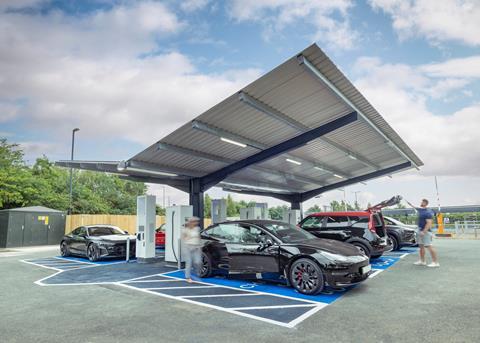
EV – charging ahead
The big news around EVs came in September with the Prime Minister Rishi Sunak announcing that he was putting back the ban on sales of new petrol and diesel cars and vans until 2035. Labour reacted, saying that if they gained power in next year’s General Election, they would reinstate the 2030 ban.
As of the end of November 2023, there were more than 950,000 fully electric cars on UK roads and a further 570,000 plug-in hybrids.
More EV charge points were installed through the year resulting in the UK reaching an ‘electric’ milestone with 50,000 public charge points being installed across the country, according to the Department for Transport. However, their target is 300,000 public charge points by 2030.
In the independent forecourt sector number one Top 50 Indie MFG is leading the charge and is busy upgrading traditional fuel sites with EV charge points. In September MFG announced that it had installed over 500 ultra-rapid EV chargers across 112 hubs throughout the UK – the highest rollout in the independent forecourt sector.
In addition, MFG said its acquisition of 340 Morrisons forecourts and 500 freehold plots of land would provide it with a strategic opportunity to become the UK’s leading charge-point operator.
Meanwhile, EG Group announced in November that it was acquiring Tesla’s latest ’ultra-fast’ charging units in a ”first-of-its-kind” deal as it boosts its third-party charge-point operation across the UK and Europe and aims to deliver on its energy transition goals.
Gridserve continued to open new hubs throughout 2023 and is also partnering with Amazon to offer its Just Walk Out technology at its Gatwick site.
On the battery technology side of things, huge advancements were made through the year. One example was Panasonic Energy’s new deal to purchase next-generation nano-composite silicon anode material for EV lithium-ion batteries from Sila Nanotechnologies Inc. These batteries could enable 500-mile non-stop trips and 10-minute recharges. Another example was car giant Stellantis working with Ample to offer battery-swap technology, capable of delivering a fully charged battery in less than five minutes.

Car wash – investment makes a comeback
Investment in automated car washes and jet washing equipment was evident throughout 2023. This was put down to the closure of many hand car washing operations and the fact that drivers are keeping their cars for longer and therefore need to take better care of them. According to the Car Wash Association, the number of hand car washing outfits has dropped from possibly 20,000 before the pandemic to around 5,000-6,000 now and, according to Autocar, the average car in the UK is 10 years old.
Unfortunately though there are still hand car washes run by unscrupulous individuals who take no notice of the rules and regulations and treat their staff appallingly. In January 2023, a man was arrested after a suspected modern slavery victim claimed that he had been forced to live and work at a south Lincolnshire car wash for more than five years. And later in the year, officers from Northumbria Police served the owner of a South Tyneside car wash with a prohibition notice, shutting down the business because of dangerous working conditions. It is shocking but the Car Wash Association has been busy shining a light on these terrible operations.
Meanwhile, in the responsible world of forecourt car washing there has been much investment in new facilities. Even MFG, which is busy knocking down car washes on some sites to make way for EV charging bays is installing jet washes instead. And Ascona’s redeveloped Machynlleth, North Wales site has a new rollover and jet car wash.
Car wash manufacturer Istobal, was busy with new launches throughout the year. It described its new J´WASH4, as a ’new dimension in pressure jet washing’. The Spanish firm also launched the Ozone Jet Wash, an environmentally friendly, ozone-in-water system that reduces operating costs.
On the automated car wash side of the business, Istobal launched the M’WASH3 PRO, a new high-end rollover that unifies its previous M’NEX32 and FLEX5 models.
International car wash brand IMO has brought together car washing and EV charging in a new deal with charging network Be.EV. Be.EV is installing and maintaining chargers across several of its sites – with four locations now live and available to use in Yorkshire, South Wales and the North East.
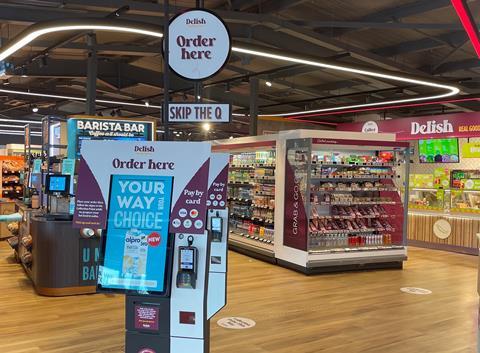
Food to go – innovation aplenty
Food to go remains a massive category for forecourt retailers and therefore 2023 saw a lot of activity across the sector.
Such is the breadth of offers across food to go, that there really is something for every operator. From the Forecourt Trader of the Year winners 2023 – Tout’s Cleeve which has its own food-to-go brand Maple Kitchen complete with development chefs – to forecourts with less space and resource that might make use of Kepak’s recently launched burger-in-a-box Hot Vend Kiosk.
Brands abound across the sector with the likes of Subway and Greggs seen right across the country. Indeed Greggs has just unveiled its 500th franchise operated store at MFG’s knockdown rebuild at Monktonhall, Musselburgh, near Edinburgh. Greggs said the number is highly significant as it continues to expand its shop estate with 71 new franchised units in 2023, representing around 20% of its total estate.
The Monktonhall site also includes Scotland’s first Miss Millie’s fried chicken outlet. MFG signed a franchise partnership agreement with Bristol-based fried chicken company Miss Millie’s earlier in 2023. Miss Millie’s has been serving chicken across the South West and Wales for over 30 years.
Sticking with chicken, and EG Group recently announced that it is selling all its 218 KFC franchise restaurants in the UK and Ireland to Yum! Brands’ KFC Division. The Top 50 Indie was the largest KFC franchisee in the UK and Ireland and the deal has been made as part of the company’s strategy to reduce its debts.
With an eye on the trend for dessert bars, Top 50 Indie Park Garage Group became the first forecourt to have a Creams Café when it opened a concession at its new Scot Lane site in Wigan in May 2023.
Another food-to-go development of note in 2023 was Spar Mallusk’s use of Skip the Q order points in-store – just like you would see in McDonald’s. Customers order and pay using the touchscreen then go and pick up their food from the counter.

Vaping – puffed up profits
Vaping may have hit the headlines for all the wrong reasons in 2023, yet it is still a category in huge growth.
According to The Grocer’s Top Products survey, vaping was the star performer across all sales categories, having doubled in value and volume sales over the course of the year.
The Grocer’s stats (in conjunction with NIQ) valued the UK vaping market at £1.69bn with Elf Bar the number one brand worth some £585m. Second was Lost Mary (£319m) and third was new brand SKE (£204m).
Concerns about children using cigarettes and vapes were addressed in the King’s Speech in November. In a new Tobacco and Vapes Bill, the government said it will introduce a new law to stop children who turn 14 this year, or younger, from ever legally being sold cigarettes in England. It will also introduce further regulations to prevent the sale and promotion of vapes to children.
The government also launched an eight-week consultation across the UK with proposals including: restricting the flavours and descriptions of vapes so that vape flavours are no longer targeted at children; and regulating pos displays in retail outlets so that vapes are kept out of sight from children and away from products that appeal to them, such as sweets.
The ACS made it clear that it supports the government’s core objectives to prevent young people from accessing vaping products and to reduce the environmental impact of disposable devices. However, it does not support a ban on disposable vapes, which it says would create an immediate boom for the illicit market and do little to stop those already trading illegitimately.





















